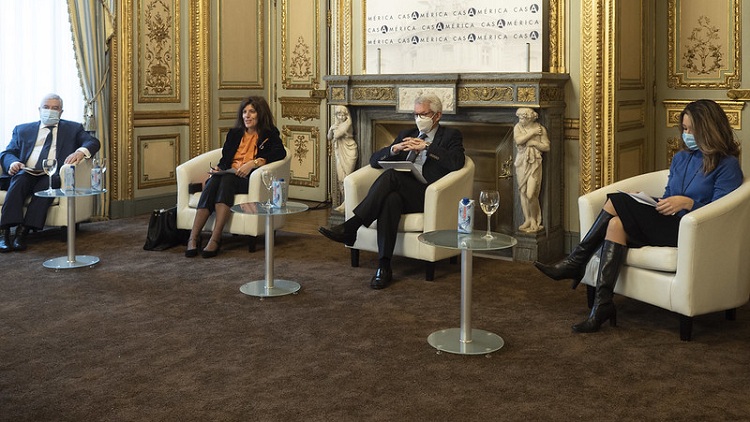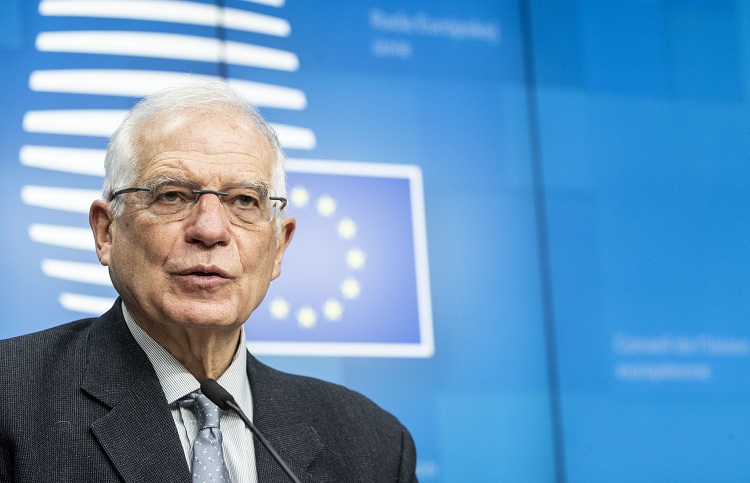The Diplomat
Senior officials from the Ministries of Foreign Affairs, Industry, Economy and Education met yesterday at Casa America with representatives of the Organization for Economic Cooperation and Development (OECD) and 22 private sector companies with the aim of promoting the digitization of learning, connectivity and online educational content in developing countries.
As reported in a note from the Ministry of Foreign Affairs, the First Roundtable of Business and Cooperation in Digital Education was held, in the framework of International Education Day, with the aim of promoting partnerships with a view to the “digitization of schools and the Internet connection of students from vulnerable households in the partner countries of Spanish Cooperation”.
During the inauguration, the State Secretary for International Cooperation, Ángeles Moreno Bau, highlighted the solidarity support of companies during the pandemic, thanks to which, she said, the Internet has been brought to rural schools, devices to homes without resources, electricity to isolated communities and free access to educational platforms has been provided and their contents improved.
In this line, he advocated joining efforts between public and private actors “to accelerate the deployment of new technologies that will define the education of the future”. In his speech, he also explained that, “given the complexity of the development challenges and the financing gap of the 2030 Agenda -4.2 trillion dollars, according to the OECD-, we must take advantage of the innovative capacity of the private sector to implement Information and Communication Technologies (ICT), as well as the great experience of Spanish cooperation to, together, produce sustainable results of scope”.
For her part, the State Secretary for Digitalization and Artificial Intelligence, Carme Artigas, explained the Government’s Digital Skills Plan and some remote training programs that could, in partnership with the publishing and telecommunications sector, be replicated in third countries. According to Artigas, the government expects 80 percent of the Spanish population to have basic digital skills by 2025, a key factor for the labor market.
The State Secretary for Trade, Xiana Méndez, recalled the financial instruments available for Spanish companies to advance in their international cooperation work in the educational sphere, given the transformative, social and economic impact involved.
The State Secretary for Education, Alejandro Tiana, stressed the importance of digital teacher training, progress in interactive classrooms, digital resources for students and data protection for minors with secure digital spaces.
The expert from the Organization for Economic Cooperation and Development (OECD), Rafael Duque, also intervened to cite the successful conditions of Public-Private Partnerships for Development (PPPD); and the director of the Spanish Agency for International Development Cooperation (AECID), Magdy Martínez Solimán, who moderated a debate with the participating companies and foundations and called them to an upcoming technical meeting to start co-designing projects.
Among the participating companies were Telefónica, Hispasat, Microsoft Ibérica, Escudo Web, Grupo Mondragón, OTBInnova, Grupo AE, Didactalia, Planeta, Santillana, Anaya, SM, Rubio, Coverwallet, Elecnor, Santander Universidades. Also in attendance were the Foundations of Telefónica, Orange, Vodafone, Pro-Futuro, Banco Santander and Mapfre.
The Ministry’s note stresses that the participation of companies in cooperation projects through agreements for the supply of assets and services seeks to join forces for the transformation of the educational digital ecosystem, which has accelerated in an exceptional way as a result of the pandemic.
It also recalls that, according to UNICEF, if appropriate measures are not taken now, around 5.9 million students in Asia, 5.3 million in Africa and 2.1 million in Latin America will never go back to school.







